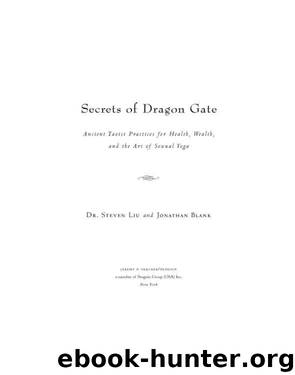Secrets of Dragon Gate by Steven Liu

Author:Steven Liu
Language: eng
Format: epub
Publisher: Penguin Publishing Group
Published: 2011-02-01T16:00:00+00:00
The Cycles of the Five Elements
Flow with whatever may happen and let your mind be free. Stay centered by accepting whatever you are doing. This is the ultimate.
—CHUANG TZU
The five elements are largely defined by the relationships among the elements. In other words, each of the elements interacts with the other elements by helping to create, subdue, foster, or hinder them. This is meant to parallel the patterns we see in life. Everything in the world experiences a cycle marked by a beginning, development, and ultimately decline. Likewise, in our lives, we see various paths to success and failure, prosperity and poverty, health and illness, wisdom and ignorance, etc.
In the cycle of the five elements, each of the elements has the property of generating or “being generated.” This cycle was described clearly in the second century A.D. by Liu An, a Chinese nobleman and scholar who authored The Huainan Philosophers, which is one of the essential texts of Taoism. He wrote:“By wood can be produced fire, by fire can be produced earth [that is, fire burns wood, which turns to soil]; from earth can be produced metal [for example, by mining]; from metal can be produced water [that is, metal can be changed through heat to a liquid state]; from water can be produced wood [that is, water feeds plants]. When fire heats metal, it makes it liquid. When water destroys fire it operates adversely upon the very element by which it is produced. Fire produces earth, yet earth counteracts water. No one can do anything against these phenomena, for the power that causes the five elements to counteract each other is according to the natural dispensation of heaven and earth. Large quantities prevail over small quantities, hence water conquers fire. Spirituality prevails over materiality, the non-substance over substance, thus fire conquers metal; hardness conquers softness, hence metal conquers wood; density is superior to incoherence, therefore, wood conquers earth; solidity conquers insolidity, therefore earth conquers water.”
Download
This site does not store any files on its server. We only index and link to content provided by other sites. Please contact the content providers to delete copyright contents if any and email us, we'll remove relevant links or contents immediately.
| Confucianism | Feng Shui |
| I Ching | Jainism |
| Karma | Shintoism |
| Sikhism | Tao Te Ching |
| Taoism | Tibetan Book of the Dead |
| Zoroastrianism |
The Tao of Physics by Fritjof Capra(2276)
Human Design by Chetan Parkyn(2075)
The Diamond Cutter by Geshe Michael Roach(2062)
Feng Shui by Stephen Skinner(1941)
The Alchemy of Sexual Energy by Mantak Chia(1860)
Tao Te Ching by Lao Tzu(1843)
365 Tao: Daily Meditations by Ming-Dao Deng(1622)
Tao Tantric Arts for Women by Minke de Vos(1600)
Sun Tzu's The Art of War by Giles Lionel Minford John Tzu Sun(1542)
Sidney Sheldon (1982) Master Of The Game by Sidney Sheldon(1520)
Buddhism 101 by Arnie Kozak(1513)
Karma-Yoga and Bhakti-Yoga by Swami Vivekananda(1496)
The Analects of Confucius by Burton Watson(1436)
The Art of War Other Classics of Eastern Philosophy by Sun Tzu Lao-Tzu Confucius Mencius(1428)
Tao te ching by Lao Tzu(1366)
The Way of Chuang Tzu by Thomas Merton(1365)
The New Bohemians Handbook by Justina Blakeney(1356)
The Sayings Of by Confucius(1317)
Bless This House by Donna Henes(1272)
